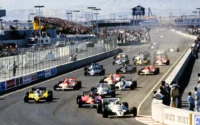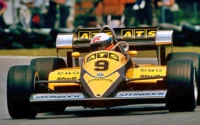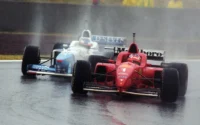ATS wasn’t just a German wheel manufacturer; it was a company that thought alloy rims and Formula One went hand in hand. Based in Bad Dürkheim, a short drive from the legendary Hockenheimring, ATS became a name in both motorsport and the tuning world. Between 1977 and 1984, Günter Schmid’s outfit even ran its own F1 team with a story as dramatic as any Grand Prix weekend.
Founded in 1969 by Günter Schmid, ATS carved its niche with lightweight alloys for Porsche, Volkswagen and Mercedes. The company’s claim to fame in the tuning scene was the iconic “Penta” wheel, which Mercedes specialist AMG fitted to its cars throughout the late ’70s and early ’80s. After backing German motorsport as a sponsor, Schmid took the ultimate plunge: he wanted ATS on the Formula One grid.
The 1970s: From Penske Hand-Me-Downs to Chaos
ATS’s Formula One adventure started in 1977 when the team bought up Penske Racing’s retired PC4 chassis. French driver Jean-Pierre Jarier delivered an encouraging debut with a 6th-place finish at Long Beach.
But the real headline that year belonged to Hans Heyer. Entered for the German Grand Prix, Heyer failed to qualify, but took the start anyway in front of his home fans at Hockenheim. His race ended when the gearbox broke, and only then did officials realise he wasn’t supposed to be on the grid in the first place.
For the rest of the year, ATS rotated drivers, with Hans Binder taking the wheel before the team skipped the last three rounds.
In 1978, Schmid hired designer Robin Herd to pen the first true ATS car, the HS1. Jarier stayed, joined by German veteran Jochen Mass. The season spiralled into a game of musical chairs: Jarier left after a bust-up with Schmid, replaced briefly by Alberto Colombo, then Keke Rosberg, then Binder, then Michael Bleekemolen. Mass broke his leg in testing, Harald Ertl tried (and failed) to qualify, and Rosberg returned for the finale. Even a new D1 chassis with skirts and wider track couldn’t lift the results.
In 1979, ATS slimmed back to one car with Hans-Joachim Stuck at the wheel. Designer duo John Gentry and Giacomo Caliri produced the D2, which was so twitchy it was soon replaced by Nigel Stroud’s D3. At least it delivered something: Stuck scored 5th at Watkins Glen, ATS’s only points that year.
The 1980s: ABBA, Accidents and BMW Power
In 1980, ATS expanded again. Marc Surer and Jan Lammers shared duties with the D3 while Gustav Brunner’s new D4 arrived. Surer impressed with 7th in Brazil but broke both legs in South Africa, forcing the team to run just one car. Lammers managed a shock 4th on the grid at Long Beach before crashing out at the start.
For 1981, Lammers returned, joined mid-season by drummer-turned-driver Slim Borgudd, who brought sponsorship from none other than Swedish pop giants ABBA. Borgudd even outqualified Lammers, earned himself a full-time seat, and scored 6th at the 1981 British Grand Prix. But consistency was nowhere to be found.
Schmid regrouped in 1982, fielding the upgraded D5 for Manfred Winkelhock and Eliseo Salazar. The gamble paid off with two 5th-place finishes, though Salazar became infamous for colliding with race leader Nelson Piquet at Hockenheim. Piquet’s fists flew as fast as his car, and the televised scuffle gave ATS its most memorable moment of the season.
The BMW Turbo Era
By 1983, ATS had secured the mighty BMW M12/13 turbo engine for its new Brunner-designed D6. On paper, it was a dream come true. In reality, reliability nightmares meant Winkelhock’s best finish was only 8th.
The 1984 season brought the D7 chassis, again designed by Brunner. Winkelhock briefly ran 3rd in Belgium before the electrics died, later salvaging 8th-place finishes in Canada and Dallas. A second car arrived mid-season for rising Austrian talent Gerhard Berger, who stunned with 6th at Monza. But because the second entry hadn’t been registered for the season, the point didn’t count.
After Winkelhock quit and BMW pulled its engines, Schmid had no choice but to shut down ATS’s F1 programme at the end of 1984.
The Next Chapter: Rial
Schmid wasn’t done with Formula One. Having launched a new wheel brand called Rial, he returned to the grid in 1988 under that name.
ATS Wheels Formula One World Championship Records
| First entry | 1977 United States Grand Prix West |
|---|---|
| Races entered | 116 (99 starts) |
| Constructors’ Championships | 0 |
| Drivers’ Championships | 0 |
| Race victories | 0 (best finish: 5th, 1979 United States Grand Prix and 1982 Brazilian and San Marino Grands Prix) |
| Pole positions | 0 (best grid position: 4th, 1980 United States Grand Prix West) |
| Fastest laps | 0 |
| Final entry | 1984 Portuguese Grand Prix |
ATS Constructors’ Championship Results
Team Names
| Years | Name |
|---|---|
| 1977–1978 | ATS Racing Team |
| 1978 | F&S Properties/ATS Racing Team |
| 1979 | ATS Wheels |
| 1980–1984 | Team ATS |
As Entry
| Year | Chassis | Engine | Tyre | No. | Drivers | Rounds |
|---|---|---|---|---|---|---|
| 1977 | Penske PC4 | Ford Cosworth DFV 3.0 V8 | G | 33 | Harald Ertl | 12, 14 |
| 34 | Jean-Pierre Jarier | 4–14 | ||||
| 35 | Hans Heyer | 11 | ||||
| Harald Ertl | 13 |
As Works
| Year | Chassis | Engine | Tyre | No. | Drivers | Rounds | WCC Points | WCC Pos. | Report |
|---|---|---|---|---|---|---|---|---|---|
| 1978 | HS1 D1 | Ford Cosworth DFV 3.0 V8 | G | 9 | Jochen Mass | 1–13 | 0 | NC | Report |
| Michael Bleekemolen | 14–16 | ||||||||
| 10 | 13 | ||||||||
| Jean-Pierre Jarier | 1–5, 11 | ||||||||
| Alberto Colombo | 6–7 | ||||||||
| Keke Rosberg | 8–10, 15–16 | ||||||||
| Hans Binder | 12 | ||||||||
| Harald Ertl | 14 | ||||||||
| 1979 | D2 D3 | Ford Cosworth DFV 3.0 V8 | G | 9 | Hans-Joachim Stuck | All | 2 | 11th | Report |
| 1980 | D3 D4 | Ford Cosworth DFV 3.0 V8 | G | 9 | Marc Surer | 1–3, 7–14 | 0 | NC | Report |
| Jan Lammers | 4–6 | ||||||||
| 10 | 1–3 | ||||||||
| Harald Ertl | 9 | ||||||||
| 1981 | D4 HGS1 | Ford Cosworth DFV 3.0 V8 | A M | 9 | Jan Lammers | 1–4 | 1 | 13th | Report |
| Slim Borgudd | 5, 7–15 | ||||||||
| 10 | 4, 6 | ||||||||
| 1982 | D5 | Ford Cosworth DFV 3.0 V8 | A M | 9 | Manfred Winkelhock | All | 4 | 11th | Report |
| 10 | Eliseo Salazar | All | |||||||
| 1983 | D6 | BMW M12/13 1.5 L4t | G | 9 | Manfred Winkelhock | All | 0 | NC | Report |
| 1984 | D7 | BMW M12/13 1.5 L4t | P | 14 | Manfred Winkelhock | 1–14 | 0 | NC | Report |
| Gerhard Berger | 16 | ||||||||
| 31 | 12, 14–15 |






